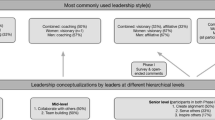Abstract
The American public entrusts academic medicine with a varied portfolio of critical responsibilities: the thoughtful mentoring of future generations of doctors, the engagement of cutting edge discoveries, and the empathic treatment of patients with complicated illnesses. The erosion of time to perform these duties has led to an estrangement of our key professional values and thus a loss of public trust, the inability to recognize new diseases, reduced communication in our ranks, and physician dissatisfaction. Much of this is driven by an unbalanced focus on the business model of medicine, highlighting rapid patient transactions linked to professional income with financial incentives for high-volume care. Reversing the current trends requires a new type of leadership committed to long-held professional values and a recognition of what drives professional excellence. As internists and infectious diseases specialists without procedures in our practice, we are especially vulnerable to these trends.
Similar content being viewed by others
References
Brill S. Bitter Pill: how outrageous pricing and egregious profits are destroying our health care. Time Mag Spec Rep. 2013; 16–55.
Joynt KE, Le BA, Orav EJ, Jha AK. Compensation of chief executives officers at non profit US hospitals. JAMA Intern Med. 2014;174:61–7.
Brill S. Bungling the easy stuff. Hospitals are still overcharging the poor. Obamacare was supposed to fix that too. What went wrong? Time Mag. 2013; 18–19.
Wenzel RP, Hayden FG, Groschel DHM, et al. Acute febrile cerebrovasculitis: a syndrome of unknown, perhaps rickettsial cause. Ann Intern Med. 1986;104:606–15.
Satcher D. Emerging infections: getting ahead of the curve. Emerg Infect Dis. 1995;1:1–6.
Fauci AS, Touchette NA, Folkers GK. Emerging infectious diseases: a 10-year perspective from the National Institute of Allergy and Infectious Diseases. Emerg Infect Dis. 2005;11:519–25.
Recovering Holder L, Loyalty Physicians. Lessons from a national physician survey on crafting a true hospital-physician partnership. Health Exec. 2003;18:65–6.
Shanafelt TD, West CP, Sloan JA, et al. Career fit and burnout among academic faculty. Arch Intern Med. 2009;169:990–5.
Edmond MB. Taylorized medicine. Ann Intern Med. 2010;153:845–6.
Verghese A. Culture shock—patient as icon, icon as patient. N Engl J Med. 2008;359:2748–51.
Cook DA, Sorensen KJ, Wilkinson JM. Value and process of curbside consultations in clinical practice: a grounded theory study. Mayo Clin Proc. 2014;89:602–14.
Pirsig RM. Zen and the art of motorcycle maintenance. An inquiry into values. New York: William Morrow & Co.; 1074.
Pohl H, Robertson D, Welch G. Repeated upper endoscopy in the medicare population. Ann Intern Med. 2014;160:154–60.
Mitchell JM. Urologists’ use of intensity—modulated radiation therapy for prostate cancer. N Engl J Med. 2013;369:1629–37.
Pink DH. Drive. The surprising truth about what motivates us. New York: Riverhead Books; 2009.
Christmas C, Kravet SJ, Durso SC, Wright SM. Clinical excellence in academia: perspectives from masterful academic clinicians. Mayo Clin Proc. 2008;83:989–94.
Agan T. Why innovators get better with age. NY times. Business. 2013; 8.
Taleb NT. Antifragile: things that gain from disorder. New York: Random House, Inc.; 2012.
Byyny RL. Leadership for the future. Pharos Alpha Omega Alpha Honor Med Soc. 2012;76:2–5.
Acknowledgments
The authors thank Deirdra McAfee and Kay Vose for carefully reviewing the manuscript and offering critical advice. It is a pleasure to contribute to the Festschrift in Gerd Fätkenheuers honor, and the manuscript is an American perspective for his comments. Having spent time with Gerd on the clinical wards and in personal conversations, I am honored to have his friendship. He has high standards, a broad view of Medicine and of life itself, and he is committed to excellence in all the academic missions of teaching, service and research. No formal funding supported this work.
Conflict of interest
The authors have no conflicts of interest.
Author information
Authors and Affiliations
Corresponding author
Rights and permissions
About this article
Cite this article
Wenzel, R.P., Edmond, M.B. Academic I.D. in jeopardy: the erosion of time, professional values, and physician satisfaction. Infection 43, 141–144 (2015). https://doi.org/10.1007/s15010-015-0744-3
Received:
Accepted:
Published:
Issue Date:
DOI: https://doi.org/10.1007/s15010-015-0744-3




